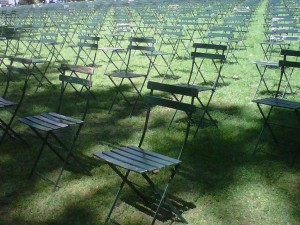The Arts and 9/11: "110 Stories"
Sep 10, 2011 by Victoria Noe, in 10th anniversary of 9/11
, 110 Stories
, 9/11
, Friend Grief
, Grief
, September 11
 |
| 2,753 empty chairs in Bryant Park |
Two nights.
Two plays.
Same subject.
But as is typical in any art form, two completely different approaches.
On Friday night I saw Sarah Tuft’s play, 110 Stories, which benefited the New York Says Thank You Foundation. There were some pretty serious problems at the location that delayed the start of the show for over an hour, but there were also some very stark difference between 110 Stories and The Guys, which I saw Thursday night.
Unlike that play, which had only two characters, 110 Stories presents introduces you to 30 people from all walks of life who were at Ground Zero on that day, or involved in the recovery effort. Also a staged reading, the characters were portrayed by a large group of actors, including Samuel L. Jackson, Kathleen Turner, Tony Shalhoub, Jeremy Piven, Stephen Baldwin, Melissa Leo and Ralph Macchio.
Also unlike The Guys, this play recounts some graphic descriptions about the recovery effort, details that had a very noticeable effect on the woman sitting next to me. She was considerably younger, perhaps in middle school when 9/11 happened. She seemed to be hearing this for the first time.
(You see, that’s a problem when you’ve lived through something like 9/11: you assume everyone knows what you know.)
Each character began with some background: their job, how they found out about the attacks, how they responded. Then it went on to what each witnessed, again, sometimes with shocking detail. But that was absolutely necessary to then explain how they coped and how their lives - and health - were changed forever.
Both plays continued the theme that has played out in the media this week about 9/11. The #1 question seems to be, “where were you when the planes hit?”
But the follow-up is always, “what’s your story about 9/11?” That’s a more expansive question, requiring a more thoughtful response. And everyone has one.
The Guys and 110 Stories are both plays, both staged readings of stories. Telling and sharing 9/11 stories is a way to make sense of something that makes no sense. Sometimes there is no answer to “why?” that is reasonable or acceptable.
But still we tell our stories, share our stories, so that others can begin to understand what it was like.
Coming next:
9/11 – Guest post by Damon DiMarco, author of Tower Stories: An Oral History of 9/11
9/12 – Ground Zero, 10 Years Later
9/13 – The Buddhists and the Brits: how other cultures and faiths commemorate 9/11
9/14 – The New 9/11 Memorial

